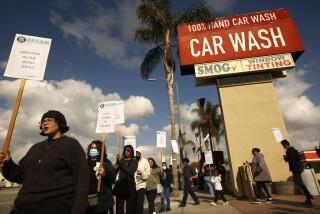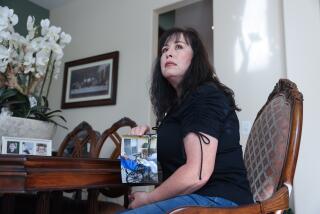Bar Assn. Urges Judges to Limit Awards
- Share via
NEW ORLEANS — Hoping to head off more drastic action in the state legislatures, the American Bar Assn. voted Tuesday to urge judges to scale down “excessive” awards to victims of accidents, malpractice and defective products.
The bar association also recommended that punitive damages be added only in those cases where there is “clear and convincing evidence” that a company or government body acted with “conscious or deliberate disregard” for the victim.
But the ABA delegates also opposed legislated “ceilings” on damage awards and suggested that the insurance industry--not the courts and lawyers--is responsible for the soaring cost of liability insurance.
Bitter Debate
The so-called liability crisis has deeply divided the nation’s largest lawyers group, and what was described as a compromise report spawned a bitter debate at the group’s meeting here. Attorneys representing business and government portrayed the court system as running amok. They say multimillion-dollar awards to victims result in higher prices and higher taxes.
But trial attorneys who represent victims say the court system is working as it should--by compensating those who are hurt by careless actions or defective products. The extra punitive damages also work to force companies to think harder about the welfare and safety of their customers, they say.
Tuesday’s resolutions were approved in a series of close votes and only after the ABA leaders said they would be “embarrassed” by a failure to take some action on the problem. Still, a motion to defer Tuesday’s ballots until August lost by only one vote, 150 to 149.
Some Limits in Place
More than half the state legislatures are considering reforms that would limit court awards in liability cases, bar leaders said, and 10 already have some form of cap on the amount that can be paid for “pain and suffering” or for punitive damages. In California, for example, medical malpractice awards for pain and suffering are limited to $250,000, and the Legislature has considered extending such a cap to other areas.
The president of the American Tort Reform Assn., whose members range from big corporations to playgrounds and the Boy Scouts, applauded Tuesday’s vote.
“This is the first time the ABA has recognized the need to clean up its own house,” said James Coyne of the tort association. Nearly 60% of the money awarded after court suits--estimated at $35 billion in 1985--goes to attorneys, Coyne said, “so we could have expected them to follow their normal tradition, which is to do nothing.”
Coalition Decries Vote
However, Joanne Doroshow, a spokeswoman for the Coalition for Consumer Justice, whose members include consumer and labor organizations, denounced the vote as an “anti-consumer” move that was engineered by big business.
“These are knee-jerk recommendations, based on very little evidence,” she said.
The ABA leaders acknowledged as much during the debate on the resolutions. Studies by the Rand Corp. and by ABA officials have found little evidence to support claims of an “explosion” of court awards in medical malpractice, product liability or personal injury cases. Rather, the fastest growth has come in areas such as suits alleging unfair business practices. A notable example was the $10.5-billion award to Penzoil because a rival company--Texaco--had sought to head off its merger with Getty Oil Co.
Awards of punitive damages were also said to be extremely rare, and among 30 cities studied, only in New York and Los Angeles was the median amount more than $50,000.
High Los Angeles Awards
In the past five years, the typical punitive award in California was $75,000, according to a second study cited. “The California figure was high in part because of the upward effect of huge punitive awards in Los Angeles, where the typical award was $90,000,” the study said.
In other action Tuesday, the ABA selected Robert D. Raven, a 63-year-old lawyer from San Francisco, as its president for 1988.
Raven, a former president of the California State Bar, said he opposes the Reagan Administration’s call for abolition of the Legal Services Corp.
More to Read
Inside the business of entertainment
The Wide Shot brings you news, analysis and insights on everything from streaming wars to production — and what it all means for the future.
You may occasionally receive promotional content from the Los Angeles Times.








